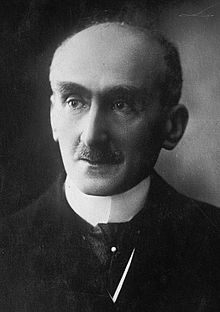Geneosophy and Bergson's philosophy
Now that Geneosophy is complete and I can give a coherent account of its assumptions and implications, I find it useful to be able to compare Geneosophy with the ideas of other thinkers. It is a bit like having a discussion with Bergson, at least as close as it gets.

Over the past month, I have been reading the works of philosopher Henry Bergson. While working on formalizing Geneosophy, I have stumbled upon a quote attributed to him. I was immediately intrigued by Bergson's ideas.
Now that Geneosophy is complete and I can give a coherent account of its assumptions and implications, I find it useful to be able to compare Geneosophy with the ideas of other thinkers. It is a bit like having a discussion with Bergson, at least as close as it gets.
Bergson was a trained mathematician, and even won a prestigious prize in his youth for solving a problem by Pascal. When he decided to pursue a career as a philosopher, his maths teacher, disappointed, famously claimed, “you could have been a mathematician; you will be a mere philosopher”. His choice of philosophy was possibly guided by a strong unconventional intuition about the need to go beyond the traditional mechanistic approach which underlies the sciences and mathematics. An insight that guided him when thinking about life, intelligence, instincts, the role of science and mathematics, freewill, morality and society is:
philosophy consists in placing oneself within the object itself by an effort of intuition.
Bergson developed many concepts that are very close to the ones you find in Geneosophy. I consider him to be the thinker who is closest to Geneosophy that I found so far. His thoughts about science, life, the Darwinian theory of evolution and the nature of time are very recognizable to me. Although Bergson's critique of the status quo is spot on and his powerful intuitions are elegantly expressed in prose using beautiful metaphors, he did not articulate a viable conceptual framework to express these intuitions into rational third person expressions that could be verified — expressions that could explain the intuition he had for life, evolution and time. Geneosophy fills this gap.
Bergson vs. the traditional approach
Bergson met Einstein in a famous meeting in Paris, where the two publicly discussed the nature of time. The consensus is that Einstein won the argument. Bergson tried to convince the audience that scientific time, measured by clocks and used by science, is not fundamental. He put forward the concept of duree, which he could only define and defend using his excellent prose. On the other hand, Einstein was armed with his theory of relativity, a testable and verified hypothesis, so it is no wonder Einstein is considered to have won the argument.
With the benefit of hindsight, Bergson vs Einstein was a conceptual match between someone whose subject of analysis and starting point was the conscious mind (Bergson) and someone whose starting point was the material world, to be discovered and analyzed.
I find Bergson's position versus the traditional consensus fascinating. He was going against the formidable castle of thought of modern science and its implicit assumptions, although he was not criticizing science and its great accomplishments. Bergson was highlighting the limitations of science and was looking for something that went beyond science that could help him make sense of his intuitions. But, unfortunately for him, the only tools he had to fight his conceptual battle were metaphors and his noteworthy writing skills. This, then, was an uneven battle against the organized legions of the modern scientific disciplines, with their testable methods for determining or approximating “truth” as they themselves defined it.
Relation to Geneosophy
Not all Bergson's ideas have a correspondence in Geneosophy, such as Bergson's concept of elan vital or the concept of real world and its representation through symbols.
However, some of Bergson's concepts have a strong correspondence to Geneosophic concepts. I will briefly highlight them. I will not attempt here to explain Geneosophy and its concepts, I just want to to show how some of Bergson's intuitions relate to Geneosophy.
Multiplicity
Bergson introduces the concept of qualitative multiplicity. He states that it consists in a temporal heterogeneity, in which:
several conscious states are organized into a whole, permeate one another, and gradually gain a richer content.
He distinguishes it from quantitative multiplicity, the state we are accustomed to when we count the number of sheep, for example. It is a difficult concept to grasp and cannot be described directly. To try to convey it, Bergson, as he always does, resorts to the use of metaphors. In Geneosophy, the concept of qualitative multiplicity is found, for example, in the formal expressions which can be thought as an etherarchy. We call it multitude.
Intuition and metaphors
Bergson introduces the concept of intuition which is a kind of holistic experience as opposed to intelligence that analyzes by breaking apart and then synthesizing. Whereas the products of intelligence can be described as a mechanism or as a mathematical formula, for example, intuition cannot be so described.
However, intuition can be elicited through the use of different metaphors or images, as Bergson calls them:
No image will replace the intuition of duration, but many different images, taken from quite different orders of things, will be able, through the convergence of their action, to direct the consciousness to the precise point where there is a certain intuition to seize on.
Bergson's distinction between intuition and intelligence is similar to the distinction in Geneosophy between comprehension and understanding.
Science
Bergson states that science concerns itself only with parts that are defined and fixed in order to act upon them:
the purpose of science is not to show us the essence of things, but to furnish us the best means of acting on them.
The limitation of science is the lack of conceptualization of the "movement" between parts:
... from situation to situation, from arrangement to rearrangement. Science may consider rearrangements that come closer and closer to each other; it may thus increase the number of moments that it isolates, but it always isolates moments. As to what happens in the interval between the moments, science is no more concerned with that than are our common intelligence, our senses and our language: it does not bear on the interval, but on the extremities.
In other words science gives an account through a crystallized framework that leaves no room for creativity and novelty. That is why science cannot explain life by tearing apart objects and reducing them to ever smaller parts. What Bergson calls movement between parts, in Geneosophy we call enliving.
Evolution
On evolution Bergson asserts that neither the mechanistic nor the teleological accounts of evolution are sufficient to explain the behaviors we ascribe to the concept of evolution. Because autonomy and creativity are impossible when evolution is explained within those accounts. In formal Geneosophy, autonomy and creativity are primitives.
Time and Duree
On time Bergson points out that the scientific time, measured by clocks, is only comprehensible as an act of consciousness. It is not primary. He refers to the "internal" time as duree. In Geneosophy the concept of duree is reminiscent of the concept of enliving of an heterarchy that does not follow an absolute time.
Conclusion
Bergson introduces multiplicity, movement between parts and duree with the help of metaphors. He feels the need to use them in his conceptual framework, but they cannot be used even to sketch a working formal expressive system that can be verified in the third person.
Bergson was missing a couple of major intuitions that are the bedrock of Geneosophy: Extended I (XI) and potentiality. Also, he lived too early to have had the benefit of more recent discoveries like computer science, neuroscience, quantum mechanics and the work of Godel and Tarski. Nevertheless, it is amazing how far his intuitions took him.
I can definitely feel Bergson's frustration when trying to highlight the limitations of science. He was confronted to Einstein's materialistic approach and the predictive success of his theory. Nowadays it is even more difficult to go against common understanding, which is so entrenched because of the discoveries of science and its applications through technological innovations. Most people will wonder how anyone in his right mind could posit that there can be something above and beyond science if science is so successful at explaining everything.
This is why reading Bergson was a source of validation for Geneosophy. I finally found someone who thought deeply about his radical intuitions and tried, as best as he could, to express them as a challenge to commonly held beliefs.
Developing Geneosophy was necessarily a lonely endeavor. It has been a miracle to find a few like-minded individuals who helped me think through and formalize the intuitions. Although he is not with us anymore, Bergson is a kindred spirit. I wish he could have joined the conversation!




